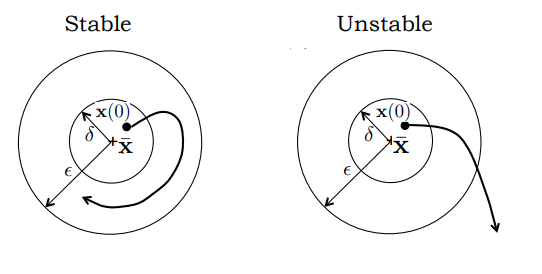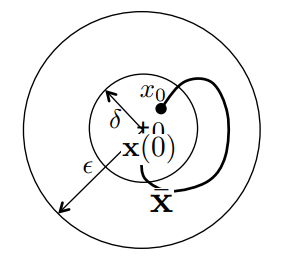Equilibrium points
For autonomous systems with the property the equilibrium points are the real roots of , which are points where starting at will remain there for all time.
If a system has an equilibrium point at an arbitrary point we can simply define incremental coordinates , allowing the system to described by , which has an equilibrium at .
Stability
Origin is a stable equilibrium of if for each , there exists a such that when
Summary: If initial conditions inside region the states will remain inside region

Asymptotic Stability
Origin is asymptotically stable equilibrium of if its stable and for
Summary: If initial conditions inside region the states will converge to zero as time goes to infinity.

Asymptotic Stability
Lyapunov Stability
The origin is a stable equilibrium of if there exists and a positive definite function on such that is negative semi-definite on . Moreover, if is negative definite on then the origin is asymptotically stable.
can be calculated using the chain rule:
Lyapunov stability can be summarized by the following conditions:
- is , continuously differentiable
LaSalle's Invariance Principle
Positively Invariant Set
A set is said to be positively invariant with respect to if
Summary: If you start in , you will stay in
LaSalle's Invariance Theorem can be used to show the asymptotic stability of an equilibrium when the derivative of the Lyapunov function is only negative semi-definite. \newline
- Let be a positively invariant set with respect to
- Let be a continuously differentiable function on such that in
- Let E be the set of all points in such that
- Let M be the largest positively invariant set in E
LaSalle’s Invariance Theorem
Exponential Stability
If there exists a function and constants such that
- is , continuously differentiable
then is exponentially stable.